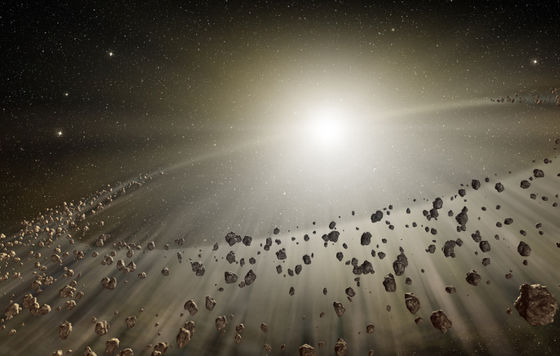Research results show that dark energy is generated from black holes in the 'reverse Big Bang'

There are various hypotheses proposed about the true identity and origin of
DESI dark energy time evolution is recovered by cosmologically coupled black holes - IOPscience
https://iopscience.iop.org/article/10.1088/1475-7516/2024/10/094
Evidence mounts for dark energy from black holes | University of Michigan News
https://news.umich.edu/evidence-mounts-for-dark-energy-from-black-holes/
Black holes that form in 'reverse Big Bang replays' could account for dark energy | Space
https://www.space.com/dark-energy-black-hole-connection
The inflation theory , the leading model for the evolution of the universe, states that a mysterious energy caused the universe to expand exponentially at the beginning of the Big Bang, about 14 billion years ago, and that in the process, all of the matter that makes up the Earth and stars in the universe was created.
Regarding this mysterious energy, Gregory Tarle, professor emeritus of physics at the University of Michigan, said, 'Very early in the universe, when gravity was very strong, a type of dark energy caused the universe to expand rapidly, and through an unknown process, this energy was converted into the matter of the present-day universe. If you ask yourself, where is the only place in the universe today where gravity is as strong as it was during inflation, the answer is inside a black hole.'

'At the center of a black hole, dark energy may be generated by the reverse process of the Big Bang, which created matter from dark energy,' suggested Tarle and his team. They analyzed data from the
DESI can observe 5,000 celestial objects at once using 5,000 optical fibers controlled by a robotic arm, making it possible to observe tens of millions of distant galaxies and accurately measure the expansion rate of the universe in the past.
After using DESI's observational records to determine how the amount of dark energy has changed over time, the team compared this data to the amount of black holes that have been born throughout the history of the universe.
They found that as more black holes are formed, the amount of dark energy in the universe is also increasing.
'The two phenomena -- the increase in dark energy and the creation of black holes -- were consistent with each other,' said Duncan Farrar, an associate professor of physics at the University of Hawaii and co-author of the paper. 'That is, as massive stars die and new black holes are formed, the amount of dark energy in the universe is also increasing in a positive direction. This makes it more likely that black holes are the source of dark energy.'
.jpg)
by DESI Collaboration/KPNO/NOIRLab/NSF/AURA/P. Horálek/R. Proctor
This is the second study to suggest the possibility of black holes whose mass increases as the universe expands, known as 'cosmologically coupled black holes.'
In 2023, Tarre and his colleagues announced that they had found that the mass of the supermassive black hole at the center of the galaxy is linked to the expansion of the universe. Because the surrounding matter in that galaxy was depleted, the black hole could not grow by normal processes, but the black hole grew in size and mass as the universe expanded.
First clues found that black holes may be the source of dark energy - GIGAZINE

One of the reasons these studies are attracting attention is that they can solve the problem of black hole singularities. It is believed that there exists a singularity at the center of a black hole where density and gravity are infinite, but the value of infinity causes the theory to break down, so Einstein's general theory of relativity no longer applies. However, if black holes are expanding along with the universe, singularities are unnecessary.
Another key difference between this study and previous studies is that most of the black holes analyzed are younger than those investigated so far: These young black holes were born when star formation was reaching its peak, rather than just when the birth of stars that lead to black hole formation was just beginning, providing new data that differs from the well-studied supermassive black holes at the centers of galaxies.
'Whether black holes are dark energy and whether they are connected to the universe is no longer just a theoretical question but an experimental question,' said Tarle, looking forward to further development and verification of the theory through future research.
Related Posts:
in Science, Posted by log1l_ks






